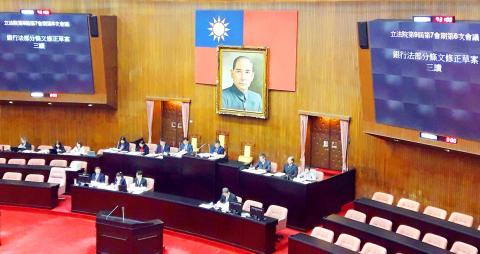Lawmakers yesterday approved amendments to the Banking Act (銀行法) to raise the maximum fine for banks that have committed major breaches of internal control and audit regulations or fail to comply with financial audits from NT$10 million to NT$50 million (US$324,307 to US$1.62 million)
Banks or other financial institutions that have not established internal controls or auditing measures would be fined between NT$2 million and NT$50 million, but those that have committed minor breaches may be exempt from punishments, the amendments state.
Bank executives or employees who destroy, conceal or falsify financial statements or refuse to open their records during a financial examination would face the same fines.

Photo: CNA
To promote cooperation between the nation’s financial regulators and their foreign counterparts, the government or other commissioned institutions can enter into agreements or protocols of cooperation, the amendments state.
The Financial Supervisory Commission may request information it deems necessary from the entities with which it has an agreement or protocol of cooperation, and may provide any information requested from these entities as long as it does not affect the interests of the public or the nation, they say.
Banks or financial institutions that have committed major breaches and do not make the necessary improvements within a prescribed period could have their supervisor removed or be closed down, they say.
The scope of the act has been extended to cover the operations of credit card companies to offer credit cardholders better protection.
Chinese Nationalist Party (KMT) Legislator William Tseng (曾銘宗), a sponsor of the amendments, said the changes are aimed at encouraging the banking sector to strictly adhere to internal control, auditing and compliance measures to protect the rights of clients through stiffer fines and granting the commission more power when taking action against offenders.
The commission said that the amendments would bring about better legal compliance at financial institutions and boost the efficiency of financial supervision, thereby curbing cross-border financial crimes and upholding security and order on the nation’s trading floors.
Additional reporting by CNA

The Sports Administration yesterday demanded an apology from the national table tennis association for barring 17-year-old Yeh Yi-tian (葉伊恬) from competing in the upcoming World Table Tennis (WTT) United States Smash tournament in Las Vegas this July. The sports agency said in a statement that the Chinese Taipei Table Tennis Association (CTTTA) must explain to the public why it withdrew Yeh from the WTT tournament in Las Vegas. The sports agency said it contacted the association to express its disapproval of the decision-making process after receiving a complaint from Yeh’s coach, Chuang

Taipei has once again made it to the top 100 in Oxford Economics’ Global Cities Index 2025 report, moving up five places from last year to 60. The annual index, which was published last month, evaluated 1,000 of the most populated metropolises based on five indices — economics, human capital, quality of life, environment and governance. New York maintained its top spot this year, placing first in the economics index thanks to the strength of its vibrant financial industry and economic stability. Taipei ranked 263rd in economics, 44th in human capital, 15th in quality of life, 284th for environment and 75th in governance,

The Hualien Branch of the High Court today sentenced the main suspect in the 2021 fatal derailment of the Taroko Express to 12 years and six months in jail in the second trial of the suspect for his role in Taiwan’s deadliest train crash. Lee Yi-hsiang (李義祥), the driver of a crane truck that fell onto the tracks and which the the Taiwan Railways Administration's (TRA) train crashed into in an accident that killed 49 people and injured 200, was sentenced to seven years and 10 months in the first trial by the Hualien District Court in 2022. Hoa Van Hao, a

Control Yuan Secretary-General Lee Chun-yi (李俊俋) tendered his resignation last night, admitting that he had misused a government vehicle, as reported by media. His resignation was immediately accepted by the Control Yuan. In a statement explaining why he had resigned, Lee apologized for using a Control Yuan vehicle to transport his dog to a pet grooming salon on May 20. The issue first came to light late last month, when TVBS News reported that Lee had instructed his driver to take the dog to the salon. The news channel broadcast photos that it said were taken by an unnamed whistle-blower, which purportedly showed the